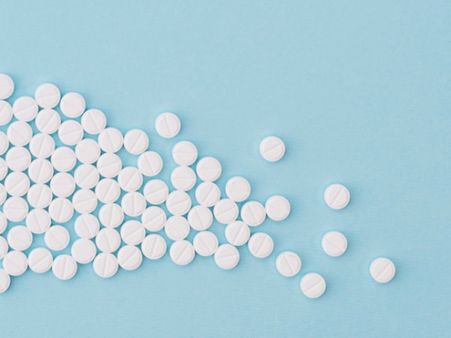Just In
- 2 hrs ago

- 6 hrs ago

- 9 hrs ago

- 11 hrs ago

Don't Miss
- Sports
 Pakistan vs New Zealand Weather Update Live, 1st T20I: Rain Begins In Rawalpindi Before Match's Schedule Time of 7:30 PM
Pakistan vs New Zealand Weather Update Live, 1st T20I: Rain Begins In Rawalpindi Before Match's Schedule Time of 7:30 PM - Technology
 Nothing Ear, Ear a With ANC, Up to 42.5 Hours of Battery Launched; Check Price and Availability
Nothing Ear, Ear a With ANC, Up to 42.5 Hours of Battery Launched; Check Price and Availability - Movies
 Anupamaa Twist | Will Yashdeep EXIT Rupali Ganguly’s Show Soon? Vaquar Shaikh REACTS: There Are Times…
Anupamaa Twist | Will Yashdeep EXIT Rupali Ganguly’s Show Soon? Vaquar Shaikh REACTS: There Are Times… - News
 Lok Sabha Pre-Poll Survey: Can Congress Turn The Tables In Haryana? Check This Opinion Poll
Lok Sabha Pre-Poll Survey: Can Congress Turn The Tables In Haryana? Check This Opinion Poll - Education
 PSEB Class 10 Toppers' List 2024, Check the Ranks of Toppers
PSEB Class 10 Toppers' List 2024, Check the Ranks of Toppers - Automobiles
 All About Electronic Stability Control ESC: Working & Advantages
All About Electronic Stability Control ESC: Working & Advantages - Finance
 Tata Motors To Utilize New $1 Billion TN Plant For Jaguar Land Rover Cars
Tata Motors To Utilize New $1 Billion TN Plant For Jaguar Land Rover Cars - Travel
Telangana's Waterfall: A Serene Escape Into Nature's Marvels
What Is Vitamin B10 (PABA)? Possible Benefits And Side Effects
Vitamin B10, also known as Para-aminobenzoic acid (PABA) is a not-so-popular vitamin type that belongs to the group of B complex vitamins. It is present in both plant-based foods such as grains and meat products.

This essential vitamin is famous by the name 'sunscreen vitamin' due to its protective activity against UV rays and 'vitamin in a vitamin' as it helps in the production of folate (vitamin B9) in the body. However, the amount produced is too low which is why folate is often consumed more from dietary sources.
In this article, we will discuss possible benefits, side effects and other details related to vitamin B10. Take a look.


Sources Of Vitamin B10 (PABA)
Foods rich in PABA includes whole grains, eggs, organ meats (liver), mushrooms and brewer's yeast. Our body can also naturally produce the chemical in the intestine with the help of certain bacteria.
Supplements of PABA is mainly used to treat various skin-related ailments such as vitiligo, Peyronie's disease and scleroderma. This is why PABA is added to topical creams and sunscreens due to its efficacy in treating skin problems. Vitamin B10 is not usually taken by mouth due to the controversy regarding its safety for some people.


Possible Benefits Of Vitamin B10 (PABA)
1. Treats skin conditions
Vitamin B10 is widely used to treat skin problems which are related to hardening or discolouration of the skin. PABA has antifibrotic activity, which is why it is effectively used in the treatment of scleroderma symptoms, Peyronie's disease and Dupuytren's contracture. [1]
2. Absorbs UV rays from the sun
UV rays damage include photocarcinogenesis and photoaging. A study has shown that PABA is an effective UV absorber that acts as a UV filter and protects against the harmful effects of the sun rays. It is added to sunscreens as a limited ingredient. [2]
3. Helps with hair growth
PABA usage is widely associated with premature greying of hair, temporary darkening of hair or to reverse greying of hair to its original colour. This chemical stimulates the production of the pigment melanin that helps to determine the colour of har, eyes and skin. [3]

4. Helps with female infertility
A study has shown the positive effect of para-aminobenzoic acid on embryonic development. The supplements of PABA greatly help treat infertility in women and facilitates fertility, that helps them get pregnant soon. [4]
5. Treats irritable bowel syndrome
PABA supplements are recommended for people with irritable bowel syndrome to treat their gastrointestinal symptoms such as abdominal pain, diarrhoea, bloating and many others. [5]
6. Acts as anti-allergic
PABA has anti-allergic and anti-inflammatory activity. This is why it is added to many topical creams for the treatment of skin-related allergies, as in the case of eczema and acute dermatitis.

7. May treat rheumatic fever
Rheumatic fever can cause inflammation in the joints, blood vessels and heart. It can be a great option for the treatment or prevention of rheumatic fever if the person is allergic to penicillin.
8. Prevents premature ageing
Premature ageing includes both early greying of hairs and ageing of the skin. PABA acts as a wonder for both the skin and hair and promotes their health positively. It makes skin look younger, prevents sunburn, prevents hair loss and darkens grey hair.
9. Helps in protein metabolism
Para-aminobenzoic acid is an organic compound that contains an attached amine group. This makes PABA acts as a coenzyme to help body cells effectively utilise protein and also help in their metabolism. [6]
10. Helps in red blood cells formation
PABA is a water-soluble vitamin and a potent antioxidant. It helps in the production of red blood cells and treats related conditions like anaemia. PABA also promotes fluidity of blood vessels for easy transportation of blood and oxygen to every body parts.

11. Helps treat conjunctivitis or corneal ulcers
PABA has a therapeutic effect on ocular diseases such as conjunctivitis or corneal ulcers. It helps reduce the symptoms of conjunctivitis such as swelling, pain, redness, itching and dryness of the eyes. [7]

Side Effects Of PABA
The dosage of PABA is an important factor for its safe usage and effectiveness. Higher doses of PABA supplements can cause side effects such as stomach pain, diarrhoea, fever, vomiting, skin rashes, liver damage and many others.
Another side effect of PABA is a drug interaction. It can decrease the effectiveness of certain medications such as antibiotics, thyroid medications or anti-seizure drugs. It is better to consult a medical expert before starting the supplements of PABA.

To Conclude
PABA or vitamin B10 is essential for many purposes and its deficiency can lead to conditions like premature ageing, digestive issues and skin problems. Vitamin B10 deficiency is also linked to nervousness, delayed growth in children and depression. Include vitamin B10 rich foods in the diet plan and stay young and healthy.

-
 pregnancy parentingWhat Are The 4 Must Have Vitamins For Kids With Diabetes?
pregnancy parentingWhat Are The 4 Must Have Vitamins For Kids With Diabetes? -
 disorders cureWhat Causes Vitamin B12 Deficiency And How To Treat It
disorders cureWhat Causes Vitamin B12 Deficiency And How To Treat It -
 wellnessCan Vitamin A Deficiency Cause Blindness?
wellnessCan Vitamin A Deficiency Cause Blindness? -
 disorders cureDoctors Urge Bengalureans To Watch Out For Vitamin D Deficiency: Its Symptoms, Causes And Treatment
disorders cureDoctors Urge Bengalureans To Watch Out For Vitamin D Deficiency: Its Symptoms, Causes And Treatment -
 wellness7 Vitamins Which Can Reduce Depression Symptoms Naturally
wellness7 Vitamins Which Can Reduce Depression Symptoms Naturally -
 kidsVitamin-rich Foods That You Can Give Your 6 Months Old Baby
kidsVitamin-rich Foods That You Can Give Your 6 Months Old Baby -
 wellnessThis Is One Major Factor Affecting Your Libido, Check It Out!
wellnessThis Is One Major Factor Affecting Your Libido, Check It Out! -
 wellnessThis Is One Best Way To Prevent Rheumatoid Arthritis
wellnessThis Is One Best Way To Prevent Rheumatoid Arthritis -
 wellnessResearch Reveals One Of The Best Ways To Prevent Diabetes Risk
wellnessResearch Reveals One Of The Best Ways To Prevent Diabetes Risk -
 wellnessVitamin B Intake May Up Lung Cancer Risk In Men: Study
wellnessVitamin B Intake May Up Lung Cancer Risk In Men: Study -
 wellnessVitamin Therapy May Prevent Deadly Skin Cancer: Study
wellnessVitamin Therapy May Prevent Deadly Skin Cancer: Study -
 wellnessFoods To Eat And Avoid In A Liver Cirrhosis Patient's Diet
wellnessFoods To Eat And Avoid In A Liver Cirrhosis Patient's Diet


 Click it and Unblock the Notifications
Click it and Unblock the Notifications



